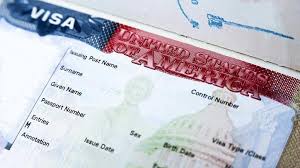Trump to Impose $250 Visa Integrity Fee on All Foreign Visitors

Ugandans planning to travel to the United States will soon face a steep rise in visa costs following the enactment of a controversial new US immigration law that introduces a $250 "Visa Integrity Fee" for most non-immigrant visas.
The fee, part of what President Donald Trump has branded the “One Big Beautiful Bill” (BBB), was signed into law on July 4, 2025, and is expected to take effect from late 2025 or early 2026, likely around October 1 when the U.S. financial year begins.
The new surcharge applies to nearly all temporary visa categories, including those for tourism (B1/B2), students (F and M), exchange visitors (J), temporary workers (H), and dependents.
Diplomats and travellers using the Visa Waiver Programme (which Uganda is not part of) are exempt.
With the current exchange rate hovering around Shs3,820 per US Dollar, the $250 integrity fee translates to about Sh955,000—more than five times Uganda's minimum monthly wage and nearly double the cost of the existing visa fee, which stands at $185 (about Sh705,000).
Together, Ugandan applicants will be expected to pay over Sh1.66 million per application, exclusive of travel and document processing costs.
According to the US government, the fee is meant to improve visa compliance and fund enforcement operations against visa overstays, status violations, and unlawful employment.
The law stipulates that this $250 charge will only be refunded if applicants fully comply with the terms of their stay, including timely departure from the US.
Critics, however, say the move is more about deterrence than integrity.
"It punishes honest travellers, students and professionals while fueling anti-migrant hysteria," said one. "America was build by immigrants, not walls and trees. This isn't about integrity, it's about exclusion."
Students hit hard
The fee will be particularly painful for Ugandan families sending their children to study in American universities.
The F-1 visa for international students will now attract a combined application cost of over Sh1.6 million, excluding additional costs like SEVIS fees, tuition deposits, and medical insurance.
"Education in the US was already expensive. Now, even before setting foot in class, parents must spend millions just for a visa," said Daniel Kirabo, a father whose son plans to attend college in Massachusetts next year.
Exchange visitors under the popular J-1 visa, often used for cultural or academic programmes, will also be affected—raising fears of reduced participation from Ugandans in internships and research collaborations.
Business travellers and tourists, already cautious due to high rejection rates at the U.S. embassy in Kampala, may now think twice before applying.
“Paying over Shs1.6 million just to be rejected or wait months for an interview is unreasonable,” said Josephine Nakalema, who recently cancelled her US travel plans. “I’ll go to Dubai or Turkey instead.”
Tourism analysts also warn that the new fee could deter African visitors from attending events like the 2026 Fifa World Cup hosted in the US, Canada, and Mexico.
Kenya, Nigeria, and Ghana—three of Africa’s largest sources of US visa applicants—will also feel the pinch.
But in Uganda, where GDP per capita is lower, the blow may be deeper.
The US State Department is expected to begin implementing the fee structure before the end of 2025. Ugandan applicants are advised to monitor announcements from the US Embassy and prepare for higher upfront costs.
Immigration consultants recommend that travelers apply early, maintain strict documentation, and ensure compliance with visa conditions to avoid forfeiting the refundable component of the integrity fee.
Whether the $250 charge succeeds in improving visa integrity or simply locks out low-income applicants remains to be seen. For many Ugandans, the dream of visiting or studying in America just got significantly more expensive.



0 Comments